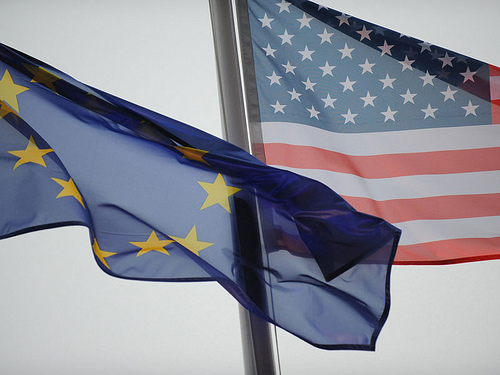
Arctic powers gather in Greenland for the latest Arctic Council ministerial, Denmark moves forward with the rollback of Schengen, the road ahead is clear for the Portugal bail out with Finland expected to support it. The British Navy laments the loss of its carrier strike capabilities and Bulgaria shrugs off its black economy as better than none.
Headlines:
Spain earthquake: Lorca residents assess damage (BBC News)
Big powers plan polar carve up as Arctic Council opens (Euractiv)
The seventh annual Arctic Council has opened in Greenland today (11 May) as secret US embassy cables released by WikiLeaks show that nations are racing to carve up the region’s oil, gas and mineral resources, as its ice retreats because of global warming.
More denial (The Economist)
A few weeks ago, my column was on debt denial. There could not be a clearer case of it today than in remarks by Christine Lagarde, the French finance minister, to Le Figaro about a potential Greek restructuring.
Finland to back Portugal’s bail-out (European Voice)
Three of the four largest parties now support giving financial aid to Portugal. It seems increasingly likely that Finland will support Portugal’s request for a €78 billion bail-out from the EU and International Monetary Fund (IMF). Jyrki Katainen, who is expected to become Finland’s next prime minister, said he will attend Monday’s meeting of eurozone finance ministers in Brussels with a mandate to approve the three-year rescue programme.
Bulgarian minister: ‘Better a black economy than none’ (Euractiv)
Bulgaria’s Economy Minister Traicho Traykov said on public television that for his country, it was "better to have a black economy than none". The comment triggered astonishment nationwide not because of its substance, but due to the fact that it came from a government minister. Dnevnik, EurActiv’s partner in Bulgaria, reports.
EU Slams Denmark over Plans to Reintroduce Border Checks(Spiegel)
Denmark’s decision to reintroduce permanent border controls has met with criticism from the European Union, which sees the move as a challenge to the principle of freedom of movement. Copenhagen insists the new checks are compatible with Schengen rules.
Carte blanche for Assad (SME)
While determined to bring at end to Muammar Gaddafi’s violence against the Libyan people, Europe has been largely silent about the terror exacted by the Basher Al Assad regime in Syria. And the sanctions against his regime announced on the 10 May are further proof of Europe’s powerlessness.
PM ‘wants fast Afghan withdrawal’ (Defence Management)
"Prime Minister David Cameron favours a faster withdrawal of troops from Afghanistan than had originally been anticipated, according to reports. Although numbers had not been confirmed, the Prime Minister has previously said that he hoped a "limited" troop withdrawal could begin in July 2011, in line with the beginning of the US withdrawal.
Loss of Carrier Strike Capability Top Concern of Royal Navy Chief (Defense News)
The head of the Royal Navy says retaining Britain’s carrier strike capability would have been top of his "wish list" if the recent strategic defense and security review were to be rewritten.
EDITORIALS AND COLUMNS:
Suspending Schengen sparks debate (Jyllands-Posten)
On the eve of a meeting at which the interior ministers of the EU are to discuss reforming the agreement on the free movement of people, Denmark announced on May 11 its intention to reinstate permanent controls at its borders with its European neighbours by early June. (Full text in Danish)
The bailouts are building a federal state (The Times)
Another year, another train crash between politics and economics in Europe. One year ago, at 1am on Monday, May 10, 2010, the leaders of the EU took what seemed their boldest step yet towards the creation of a full-scale European political federation, bolder even than the launch of the single currency in 1999. This was the creation of a €750 billion fund, guaranteed collectively by all European taxpayers, to protect EU nations from the choice facing Greece that night: to abandon the euro or to declare itself bankrupt by defaulting on its government debts.
Image: transatlantic.jpg
